Electric screwdrivers: features and tips for choosing

The electric screwdriver is a popular and sought-after power tool and is found in the home arsenal of most men. The device often combines the functions of a drill and a hammer drill, which is why it is often purchased as an inexpensive alternative to such devices.
Device and technical characteristics
Despite the large model range of devices with a large number of additional functions, the design diagram and the principle of operation are approximately the same for all screwdrivers. There are, of course, differences, but they are much more important for repair service technicians than for an ordinary consumer.
The basic structure of a classic screwdriver includes the following units:
- high-strength housing with control buttons located on it;
- an electric motor that converts electrical energy into torque;
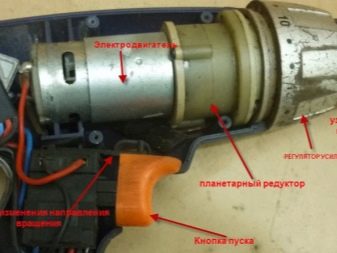

- a gearbox that transfers rotation from the electric motor to the spindle and is made of technical plastic or metal;
- chuck, securely fixing the working tool;
- a power wire connecting the device to a 220 V power source.
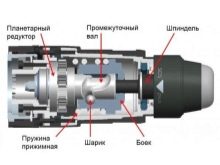


One of the main technical characteristics of an electric screwdriver is its power. In most household models, it does not exceed 500 W, but in more "serious" instruments it reaches 900 W or more. The device is controlled by means of a start button and a reverse switch. When you turn on the reverse, the polarity of the power supply changes, and the engine starts to rotate in the opposite direction. This allows you to unscrew previously twisted hardware.

The gearbox, as a rule, has two speeds. At a low level of only 450 vol. / min., screwing or unscrewing screws and self-tapping screws is carried out, and at a higher one, reaching 1400 revolutions, drilling of wooden, plastic and even metal surfaces. Due to the high rotation speed, the powerful screwdriver can work not only as an electric screwdriver, but also replace an electric drill.
Another important parameter is the magnitude of the torque, which shows the force of the impact of the bits on the hardware.
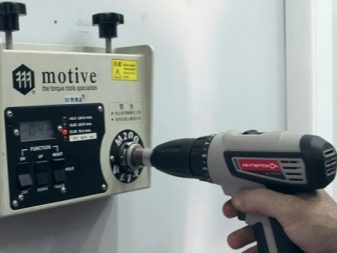

The type of material with which the screwdriver is able to work entirely depends on this value. In ordinary household models, this indicator is rarely higher than 15 N * m, while in professional devices it can reach 130 N * m. Thus, household appliances are designed primarily for tightening short screws and self-tapping screws, and with the help of a professional device, you can tighten long and thick dowels and anchors.
Advantages and disadvantages
High consumer demand for electric screwdrivers due to a number of indisputable advantages of this versatile tool.
- Low weight favorably distinguishes electrical devices from their battery counterparts and makes working with the tool convenient and comfortable.
- Due to the constant voltage, the device does not suffer power losses during operation, as is the case with battery-powered screwdrivers.

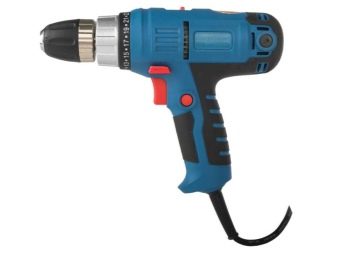
- The ability to use the tool as a drill and even a hammer drill significantly increases the scope of its application and increases demand.
- A wide price range allows you to purchase a device at an affordable price and significantly save your budget.
- A large assortment of samples on the market increases the consumer availability of the device and allows you to satisfy even the most demanding request.
However, along with many obvious advantages, the instrument still has weaknesses. The disadvantages include the need to have a nearby source of electrical power, which is not always convenient when working in a summer cottage or in a place remote from electrical outlets. Often, in order to solve the problem, you have to use an extension cord, and this is not always technically possible. The inability to work in the rain is also considered a disadvantage. However, this requirement applies to many other tools and is due to the need to comply with safety measures that prohibit the operation of electrical appliances in such conditions.


Criterias of choice
Before you start buying an electric screwdriver, you need to determine for what types of work the tool is purchased and how often it will be used. For example, if the device is purchased exclusively for home use or for assembling cabinet furniture, then it is better to choose an inexpensive compact model with a power of 450 to 650 watts. Such a device, of course, will not cope with twisting dowels, however, screwing screws and self-tapping screws, as well as drilling holes in wood, brick and plastic, is quite within its power. Moreover, its capacity is quite enough for mixing small portions of building mixtures and cement.


If the device is required for professional activities, then you should pay attention to "serious" multifunctional devices that can replace not only an electric drill, but also an average perforator in terms of power.
The next selection criterion is the torque value. As mentioned above, for home appliances, an indicator of up to 15 N * m will be enough, while for professional work you need to buy a device with a torque value of at least 100-130 N * m. Pay attention to the engine speed as well. However, when choosing home appliances, there is no particular difference between a powerful and a weak motor - even the simplest screwdriver will turn out to tighten the screw or assemble the cabinet. If the tool is purchased for drilling holes, then it is better to choose a model with a higher speed. The higher the number of turns, the easier it is to control the tool, the smoother the edges at the holes will be.

Another important feature is the presence of a speed switch. The presence of this option, in fact, differs a conventional electric screwdriver from a multifunctional device that can be used as a drill. Another selection criterion is the availability of options. These include a reverse function, electronic control and the ability to lock the spindle when changing a drill or bit. You also need to pay attention to the chuck, which is of two types: key and keyless. The first, although it fixes the drill very reliably, has a number of disadvantages.

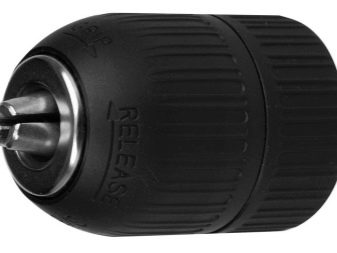
First, there should always be a key at hand, which is often lost. Secondly, tool change takes quite a long time. And thirdly, the teeth on the key wear out over time, so the key will constantly need to be replaced.
The second type of chuck - keyless - does not require a key. However, it often breaks, holds the tool worse and is constantly clogged with dust and dirt. As you can see, both cartridges have both strengths and weaknesses, and which one to choose depends on the purpose of the tool and the personal preferences of the buyer.

Popular models
There are a huge variety of screwdrivers on the modern electric tool market. Among them there are both eminent brands and inexpensive little-known models. And despite the fact that most of them fully meet modern requirements and are of high quality, some should be specially noted.
- Model Makita HP 20170F is one of the most bought and demanded. The device is equipped with two handles, a release clutch that instantly stops the rotation of the drill when the tip is pinched, and a lock button. The device is placed in a compact case, convenient for transporting and storing the tool.
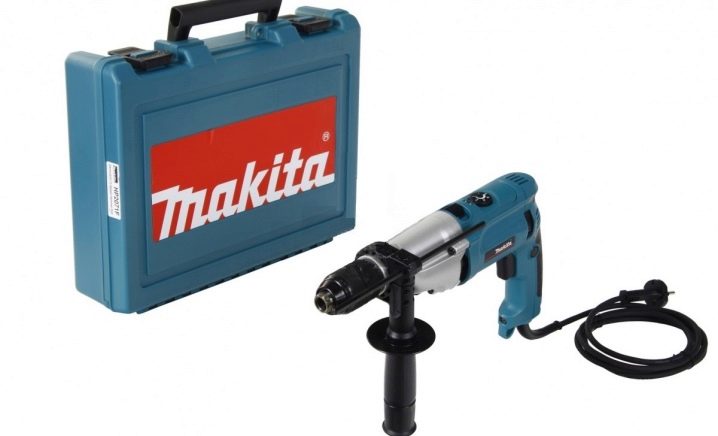
The chuck of the screwdriver has a reliable cam design - it allows you to change the nozzles using a wrench. Of the options there is a backlight that allows you to work in the dark. The device is distinguished by its simple design and long service life. The disadvantage of the model is the poor functioning of the split couplings, which do not always work the first time.
- Domestic model "Bison ZSSH 300-2" It is also a popular household tool of the "electric drill-screwdriver" type. The device is equipped with a five-meter long cable, a switch interlock, which is responsible for the continuity of the device, and a safety clutch. The device is designed for screwing screws and self-tapping screws, as well as for drilling wood, plastic and thin metal surfaces. The model is distinguished by its low cost, reliable bit clamping and comfortable grip. The disadvantages include the lack of a suitcase.

- Screwdriver "Energomash DU-21 500" also belongs to the category of inexpensive devices and is equipped with a quick-release chuck, a comfortable handle and an additional set of brushes. The tool is easy to operate, lightweight and equipped with a clip for fastening. The disadvantages include a short two-meter wire and the need to take breaks from work in order for the device to cool down.

- Elmos ESR 913 C - a particularly powerful model with 2 rotation speeds, a depth limiter for the holes being formed, a keyless chuck and a shutdown lock. In addition, the device is equipped with an additional handle, a reversing system and a torsion clutch. The disadvantages include too short a cord, which creates great inconvenience when working in hard-to-reach places.

- Hitachi D10VC2 - a medium-power device that looks like a pistol and is equipped with a quick-release chuck and a locking button. The frequency of revolutions is regulated by a special wheel, and the device itself is activated by pressing the trigger. The tool is lightweight and very easy to use. In addition to tightening screws, it can drill various surfaces and stir the mortar. The disadvantages include a strong hum of the gearbox and a weak tightening torque at low speeds.

The correct choice, as well as competent operation of the electric screwdriver, will ensure a long and trouble-free operation of the device for many years and will make working with it convenient and comfortable.
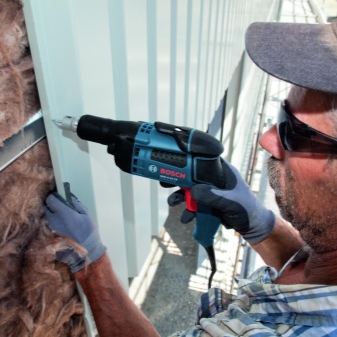

Useful tips for choosing electric screwdrivers in the video below.













The comment was sent successfully.